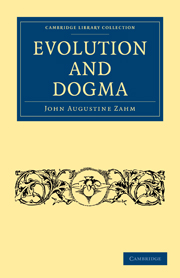Book contents
- Frontmatter
- PREFATORY NOTE
- Contents
- INTRODUCTION
- PART I EVOLUTION, PAST AND PRESENT
- PART II EVOLUTION AND DOGMA
- CHAPTER I MISCONCEPTIONS OF THEORY, ERRORS IN DOCTRINE AND MISTAKES IN TERMINOLOGY
- CHAPTER II MONISM AND EVOLUTION
- CHAPTER III AGNOSTICISM AND EVOLUTION
- CHAPTER IV THEISM AND EVOLUTION
- CHAPTER V THE ORIGIN AND NATURE OF LIFE
- CHAPTER VI THE SIMIAN ORIGIN OF MAN
- CHAPTER VII TELEOLOGY, OLD AND NEW
- CHAPTER VIII RETROSPECT, REFLECTIONS AND CONCLUSION
- AUTHORS AND WORKS CITED IN “EVOLUTION AND DOGMA.”
- GENERAL INDEX
CHAPTER II - MONISM AND EVOLUTION
Published online by Cambridge University Press: 29 August 2010
- Frontmatter
- PREFATORY NOTE
- Contents
- INTRODUCTION
- PART I EVOLUTION, PAST AND PRESENT
- PART II EVOLUTION AND DOGMA
- CHAPTER I MISCONCEPTIONS OF THEORY, ERRORS IN DOCTRINE AND MISTAKES IN TERMINOLOGY
- CHAPTER II MONISM AND EVOLUTION
- CHAPTER III AGNOSTICISM AND EVOLUTION
- CHAPTER IV THEISM AND EVOLUTION
- CHAPTER V THE ORIGIN AND NATURE OF LIFE
- CHAPTER VI THE SIMIAN ORIGIN OF MAN
- CHAPTER VII TELEOLOGY, OLD AND NEW
- CHAPTER VIII RETROSPECT, REFLECTIONS AND CONCLUSION
- AUTHORS AND WORKS CITED IN “EVOLUTION AND DOGMA.”
- GENERAL INDEX
Summary
Hæckel and Monism
HISTORICALLY considered, Monism, as a system of philosophy, is as old as speculative thought. It has, however, had various and even contradictory meanings. Etymologically, it indicates a system of thought, which refers all phenomena of the spiritual and physical worlds to a single principle. We have, accordingly, idealistic Monism, which makes matter and all its phenomena but modifications of mind; materialistic Monism, which resolves everything into matter; and, finally, the system of those who conceive of a substance that is neither mind nor matter, but is the underlying principle or substantial ground of both. In each and all of its forms, Monism is opposed to the philosophical Dualism which recognizes two principles—matter and spirit.
The Monism, however, with which we have to deal here, is not the idealism of Spinoza, Berkeley, Hume, Hegel or Schopenhauer, nor the atheistic Materialism of D'Holbach and La Mettrie, which was but a modified form of Epicureanism, but rather a later development of these errors. An outgrowth of recent speculations in the natural and physical sciences, its origin is to be traced to certain hypotheses connected with some of the manifold modern theories of Evolution.
The universally-acknowledged protagonist of contemporary Monism is Ernst Hæckel, professor of biology in the University of Jena. He is often called “the German Darwin,” and is regarded, with Darwin and Wallace, as one of the founders of the theory of organic Evolution.
- Type
- Chapter
- Information
- Evolution and Dogma , pp. 230 - 253Publisher: Cambridge University PressPrint publication year: 2009First published in: 1896



